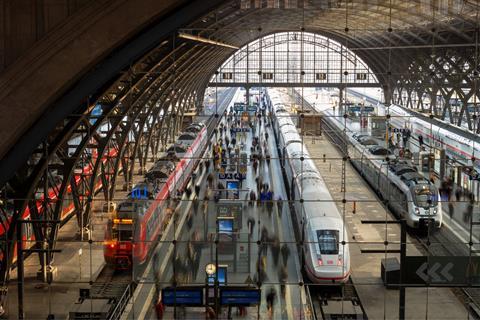
GERMANY: Hopes that the flow of investment in the Deutsche Bahn network would lead to a rapid improvement in operational and financial performance were dashed on July 25 when DB published its half-year results.
One highlight was a 4∙9% rise in the total number of passengers carried at 919∙2 million, thanks in part to the attractively priced Deutschland-Ticket. Passenger-km also rose, reaching a total of 40 377 million compared with 38 323 million in the first half of 2023.
While overall punctuality of passenger trains was 1∙7% down compared with 2023, on-time performance for long-distance services run by DB Fernverkehr slumped to a low of 62∙7%. Long-distance rail travel also fell, with 64∙2 million passengers, 4 million fewer than in the previous year. Revenue in this sector reached €2∙8bn, giving an operating loss of €232m compared with €62m in the first half of 2023.
Regional passenger services benefitted from sales of the Deutschland-Ticket, with traffic up by nearly 6% at 855 million journeys. Passenger-km at DB Regio rose by more than 17% to reach a total of 19 508 million.
Continuing a decline noted in 2023 and reflecting the national economy, DB Cargo’s traffic totalled just 92∙9 million tonnes and 35 699 million tonne-km, down by 10∙2% and 7∙6% respectively in comparison with January to June 2023. Coal, mineral products, building materials and steel traffic all declined while intermodal business stagnated.
Reflecting the need to turn performance round, DB Cargo will be restructured ‘with simplification of production structures and processes’ on January 1 2025, the half-year report noted. More robust and more resilient services are expected from a high frequency network between yards, while wagonload traffic will be reorganised with effect from the timetable change on December 15 this year.
Following agreement from the European Commission in May, wagonload services will receive support worth €320m this year. Trainload and intermodal traffic will also be reorganised to improve traction efficiency and make better use of staff.
DB’s adjusted EBIT for January to June 2024 was -€677m with a net loss after taxes of €1∙2bn compared with just €71m in the first half of 2023. Positive figures from DB’s profitable logistics subsidiary Schenker partly offset the losses in the core business, but this source of revenue will cease once the sale of Schenker is concluded.
Thanks to a rise in government funding, DB’s net capital expenditure, including state equity support, rose by 35% to €4bn, with the gross figure up by 18% at €7∙3bn. DB has set a target of improving EBIT for what it terms the ‘Integrated Rail System’ by around €2bn for the full year. This will be helped by government support for infrastructure maintenance, which is expected to take effect in the second half of the year.
Expressing the hope that DB would generate an operating profit over the full year, Chairman of DB’s Management Board Dr Richard Lutz highlighted ‘unprecedented extreme weather events’ that pushed ageing infrastructure beyond its limits as one of the issues affecting performance. Other factors were strikes and accidents, he said.
Chief Financial Officer Dr Levin Holle remarked that ‘all business units in the Integrated Rail System must become profitable again’. This means that ‘we need to significantly improve our cost efficiency’, he continued, noting that the financial effects of industrial action in the first half of the year had cost the business around €300m.

















